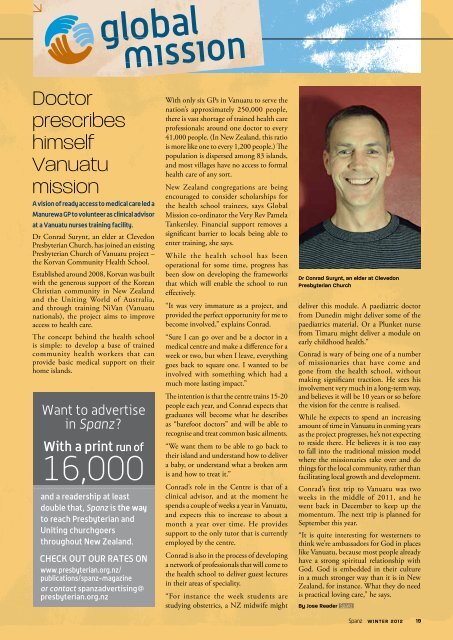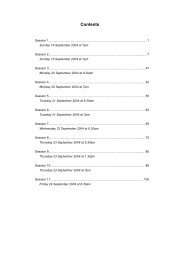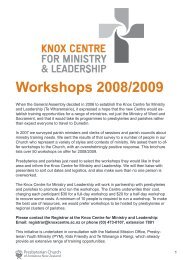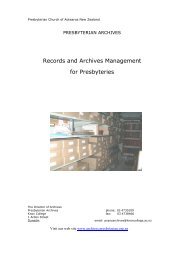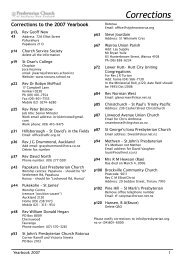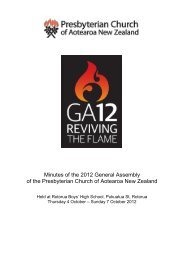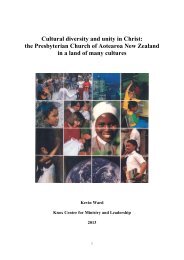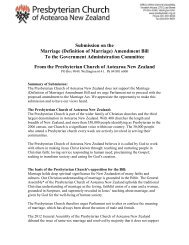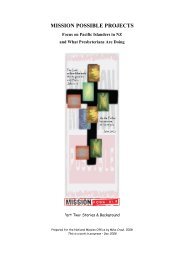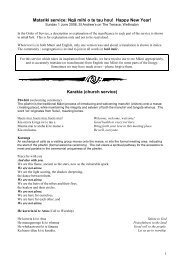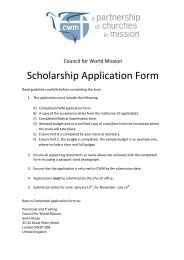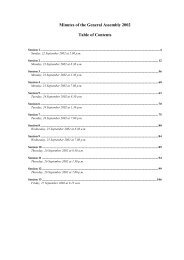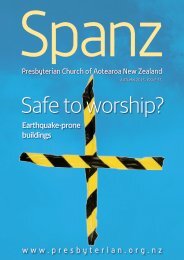Winter edition of Spanz - Presbyterian Church of Aotearoa New ...
Winter edition of Spanz - Presbyterian Church of Aotearoa New ...
Winter edition of Spanz - Presbyterian Church of Aotearoa New ...
You also want an ePaper? Increase the reach of your titles
YUMPU automatically turns print PDFs into web optimized ePapers that Google loves.
Doctor<br />
prescribes<br />
himself<br />
Vanuatu<br />
mission<br />
A vision <strong>of</strong> ready access to medical care led a<br />
Manurewa GP to volunteer as clinical advisor<br />
at a Vanuatu nurses training facility.<br />
Dr Conrad Surynt, an elder at Clevedon<br />
<strong>Presbyterian</strong> <strong>Church</strong>, has joined an existing<br />
<strong>Presbyterian</strong> <strong>Church</strong> <strong>of</strong> Vanuatu project –<br />
the Korvan Community Health School.<br />
Established around 2008, Korvan was built<br />
with the generous support <strong>of</strong> the Korean<br />
Christian community in <strong>New</strong> Zealand<br />
and the Uniting World <strong>of</strong> Australia,<br />
and through training NiVan (Vanuatu<br />
nationals), the project aims to improve<br />
access to health care.<br />
The concept behind the health school<br />
is simple: to develop a base <strong>of</strong> trained<br />
community health workers that can<br />
provide basic medical support on their<br />
home islands.<br />
Want to advertise<br />
in <strong>Spanz</strong>?<br />
With a print run <strong>of</strong><br />
16,000<br />
and a readership at least<br />
double that, <strong>Spanz</strong> is the way<br />
to reach <strong>Presbyterian</strong> and<br />
Uniting churchgoers<br />
throughout <strong>New</strong> Zealand.<br />
CHECK OUT OUR RATES ON<br />
www.presbyterian.org.nz/<br />
publications/spanz-magazine<br />
or contact spanzadvertising@<br />
presbyterian.org.nz<br />
With only six GPs in Vanuatu to serve the<br />
nation’s approximately 250,000 people,<br />
there is vast shortage <strong>of</strong> trained health care<br />
pr<strong>of</strong>essionals: around one doctor to every<br />
41,000 people. (In <strong>New</strong> Zealand, this ratio<br />
is more like one to every 1,200 people.) The<br />
population is dispersed among 83 islands,<br />
and most villages have no access to formal<br />
health care <strong>of</strong> any sort.<br />
<strong>New</strong> Zealand congregations are being<br />
encouraged to consider scholarships for<br />
the health school trainees, says Global<br />
Mission co-ordinator the Very Rev Pamela<br />
Tankersley. Financial support removes a<br />
significant barrier to locals being able to<br />
enter training, she says.<br />
While the health school has been<br />
operational for some time, progress has<br />
been slow on developing the frameworks<br />
that which will enable the school to run<br />
effectively.<br />
“It was very immature as a project, and<br />
provided the perfect opportunity for me to<br />
become involved,” explains Conrad.<br />
“Sure I can go over and be a doctor in a<br />
medical centre and make a difference for a<br />
week or two, but when I leave, everything<br />
goes back to square one. I wanted to be<br />
involved with something which had a<br />
much more lasting impact.”<br />
The intention is that the centre trains 15-20<br />
people each year, and Conrad expects that<br />
graduates will become what he describes<br />
as “barefoot doctors” and will be able to<br />
recognise and treat common basic ailments.<br />
“We want them to be able to go back to<br />
their island and understand how to deliver<br />
a baby, or understand what a broken arm<br />
is and how to treat it.”<br />
Conrad’s role in the Centre is that <strong>of</strong> a<br />
clinical advisor, and at the moment he<br />
spends a couple <strong>of</strong> weeks a year in Vanuatu,<br />
and expects this to increase to about a<br />
month a year over time. He provides<br />
support to the only tutor that is currently<br />
employed by the centre.<br />
Conrad is also in the process <strong>of</strong> developing<br />
a network <strong>of</strong> pr<strong>of</strong>essionals that will come to<br />
the health school to deliver guest lectures<br />
in their areas <strong>of</strong> speciality.<br />
“For instance the week students are<br />
studying obstetrics, a NZ midwife might<br />
Dr Conrad Surynt, an elder at Clevedon<br />
<strong>Presbyterian</strong> <strong>Church</strong><br />
deliver this module. A paediatric doctor<br />
from Dunedin might deliver some <strong>of</strong> the<br />
paediatrics material. Or a Plunket nurse<br />
from Timaru might deliver a module on<br />
early childhood health.”<br />
Conrad is wary <strong>of</strong> being one <strong>of</strong> a number<br />
<strong>of</strong> missionaries that have come and<br />
gone from the health school, without<br />
making significant traction. He sees his<br />
involvement very much in a long-term way,<br />
and believes it will be 10 years or so before<br />
the vision for the centre is realised.<br />
While he expects to spend an increasing<br />
amount <strong>of</strong> time in Vanuatu in coming years<br />
as the project progresses, he’s not expecting<br />
to reside there. He believes it is too easy<br />
to fall into the traditional mission model<br />
where the missionaries take over and do<br />
things for the local community, rather than<br />
facilitating local growth and development.<br />
Conrad’s first trip to Vanuatu was two<br />
weeks in the middle <strong>of</strong> 2011, and he<br />
went back in December to keep up the<br />
momentum. The next trip is planned for<br />
September this year.<br />
“It is quite interesting for westerners to<br />
think we’re ambassadors for God in places<br />
like Vanuatu, because most people already<br />
have a strong spiritual relationship with<br />
God. God is embedded in their culture<br />
in a much stronger way than it is in <strong>New</strong><br />
Zealand, for instance. What they do need<br />
is practical loving care,” he says.<br />
By Jose Reader<br />
WINTER 2012<br />
19


